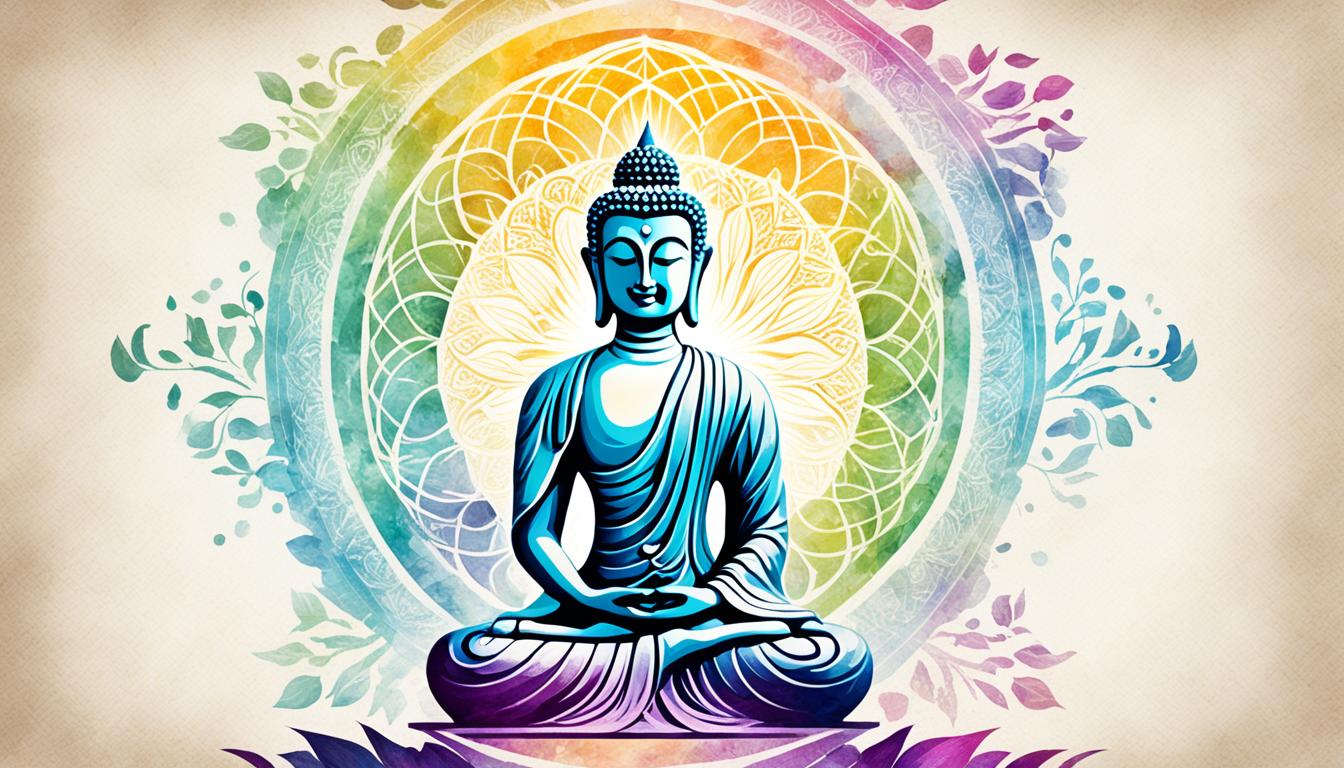“Do not dwell in the past, do not dream of the future, concentrate the mind on the present moment.” – Buddha
Welcome to a journey of self-discovery and inner peace. Buddhism, a spiritual life path rather than a traditional religion, offers profound insights into the human experience. As you embark on this exploration, you may find yourself drawn to the main belief of Buddhism, seeking answers to questions about suffering, existence, and the nature of reality.
Unlike conventional religions, Buddhism is non-theistic, meaning there is no deity to worship. The founder of Buddhism, Siddhartha Gautama (Buddha), imparted teachings that guide individuals towards reducing personal suffering and embracing life fully. These teachings are compatible with other faith traditions and welcome individuals of all backgrounds and beliefs.
Key Takeaways:
- Buddhism is a spiritual life path, offering a philosophy of life rather than a traditional religion.
- The main belief of Buddhism is focused on reducing personal suffering and fully engaging with life.
- Buddhism is non-theistic, meaning there is no worship of deities.
- The teachings of Buddhism are compatible with other faith traditions and open to individuals of all backgrounds.
The Teachings of Buddha
Discover the profound wisdom of Buddha’s teachings that have guided generations to find meaning and liberation.
At the core of Buddhism lie the timeless principles that address the fundamental nature of suffering and provide a transformative path towards liberation. These teachings, rooted in the wisdom and compassion of Buddha, offer profound insights and practical guidance for navigating the complexities of life.
Four Noble Truths:
- Suffering arises from desire and attachment.
- Identify the cause of suffering.
- Cease craving and attachment to end suffering.
- Follow the Eightfold Path towards liberation.
The Eightfold Path:
- Right Understanding: Develop a clear understanding of the nature of reality and the causes of suffering.
- Right Intent: Cultivate positive intentions and let go of harmful thoughts and desires.
- Right Speech: Use truthful, kind, and compassionate words that promote understanding and harmony.
- Right Action: Engage in actions that are ethical, compassionate, and conducive to the welfare of all beings.
- Right Livelihood: Choose a livelihood that is honest and harmonious, avoiding occupations that cause harm to oneself or others.
- Right Effort: Cultivate positive qualities and abandon negative habits through diligent and skillful effort.
- Right Mindfulness: Develop an attentive and non-judgmental awareness of the present moment.
- Right Concentration: Cultivate focused and tranquil states of mind through meditation, leading to insight and wisdom.
Buddhist teachings encourage individuals to embrace these principles, fostering wisdom, compassion, and inner peace. Through the integration of these teachings into daily life, one can navigate life’s challenges with clarity and mindfulness.

| Principle | Description |
|---|---|
| Four Noble Truths | Understanding the nature of suffering and the path to its cessation. |
| Eightfold Path | A practical guide to ethical and mindful living. |
| Dependent Origination | Understanding the interconnectedness of all phenomena. |
| Karma | Understanding the law of cause and effect. |
| Anatta | Recognizing the absence of a permanent self. |
| Sunyata | Understanding the ultimate reality of emptiness. |
Mindfulness and Meditation in Buddhism
Mindfulness and meditation play pivotal roles in the practice of Buddhism. Buddha himself advocated for the cultivation of mindful awareness in every aspect of life. By engaging in meditation, individuals gain the ability to observe their thoughts and emotions without becoming attached to them, leading to a profound sense of calm and clarity.
In today’s fast-paced world, distractions are abundant, making it even more crucial to incorporate mindfulness into our daily lives. By practicing mindfulness, you can create a sanctuary for inner peace and self-reflection amidst the chaos.

Through meditation, you can develop a heightened sense of awareness and a deep connection with the present moment. As you learn to focus your attention on your breath, bodily sensations, or specific objects of meditation, distractions gradually fade away, allowing you to experience a state of tranquility and insight.
In Buddhism, there are various meditation techniques, including focused attention meditation, loving-kindness meditation, and mindfulness meditation. Each technique offers unique benefits and contributes to the overall journey of spiritual awakening and self-discovery.
The Benefits of Mindfulness and Meditation in Buddhism
- Enhanced self-awareness and self-acceptance
- Reduced stress and anxiety
- Improved concentration and focus
- Increased emotional resilience
- Enhanced empathy and compassion
- Deepened sense of connectedness with oneself and others
By regularly practicing mindfulness and meditation, you can cultivate these qualities and tap into your inner wisdom, leading to a more fulfilling and meaningful life.
Comparison of Mindfulness and Meditation Techniques
| Technique | Focus | Benefits |
|---|---|---|
| Focused Attention Meditation | Concentration on a specific object (e.g., breath) | Increased focus and mental clarity |
| Loving-Kindness Meditation | Cultivating feelings of love and kindness towards oneself and others | Enhanced empathy, compassion, and positivity |
| Mindfulness Meditation | Observing the present moment without judgment | Heightened self-awareness, stress reduction, and emotional regulation |
Combining mindfulness with meditation allows you to fully embrace the transformative power of Buddhism in your everyday life. By training your mind to be more present and compassionate, you can navigate life’s challenges with greater ease and find solace in the present moment.
Compassion and Kindness in Buddhism
Buddha emphasized the importance of compassion and loving-kindness towards oneself and others. By cultivating a heart of kindness, individuals can promote peace and unity in their surroundings. These principles of compassion can bridge gaps and foster harmony in a world often divided by differences.
Compassion, or karuna in Buddhism, is the empathetic understanding of the suffering of others and the desire to alleviate it. It involves seeing the interconnectedness of all beings and responding with kindness and support. Compassion is not limited to those who are close to us, but extends to all living creatures.
Loving-kindness, or metta, is the cultivation of a genuine goodwill and friendliness towards all beings. It involves wishing well for others, including oneself, and actively cultivating positive emotions such as love, kindness, and empathy. Loving-kindness embraces all beings, regardless of their backgrounds or beliefs.
The Power of Compassion and Loving-Kindness
Compassion and loving-kindness are not merely sentimental or passive attitudes. Rather, they are powerful transformative forces that have the ability to create positive change within individuals and society as a whole.
When we practice compassion, we open ourselves up to the suffering of others, allowing us to develop empathy and understanding. This deep connection with others cultivates a sense of unity and shared humanity, breaking down the barriers that separate us. Compassion compels us to take action and make a difference in the lives of others.
Loving-kindness, on the other hand, helps us cultivate a sense of unconditional love and acceptance for ourselves and others. It allows us to let go of judgments, biases, and resentments, and instead fosters a genuine desire for the well-being and happiness of all beings. This practice of loving-kindness creates an atmosphere of warmth and goodwill, fostering harmonious relationships and dispelling animosity.
Through the practice of compassion and loving-kindness, we not only transform ourselves but also contribute to the greater healing and transformation of the world around us.

By embracing compassion and loving-kindness in our daily lives, we can cultivate a genuine sense of connection, empathy, and care for all beings. These qualities not only bring inner peace and happiness but also have the power to create a more compassionate and harmonious world.
| Compassion in Buddhism | Loving-Kindness in Buddhism |
|---|---|
| Focuses on alleviating the suffering of others | Cultivates unconditional love and acceptance towards oneself and others |
| Sees the interconnectedness of all beings | Embraces all beings, regardless of backgrounds or beliefs |
| Compels individuals to take action and make a difference | Fosters harmonious relationships and dispels animosity |
Detachment and Embracing Change in Buddhism
In Buddhism, detachment is a practice that encourages individuals to let go of attachment to outcomes, possessions, and beliefs. It does not promote indifference but invites you to appreciate the present moment without clinging to desires or expectations. By cultivating detachment, you can find a profound sense of freedom and inner peace.
Detachment reminds us that everything in life is impermanent. The Buddha taught that change is an inherent part of existence, and resisting it only leads to suffering. Embracing change, on the other hand, allows you to flow with the natural rhythm of life. It opens the door to personal growth, resilience, and transformation.
Through detachment and embracing change, Buddhism offers valuable insights for navigating the challenges and uncertainties of life. By letting go of attachments and embracing impermanence, you can find peace and contentment in the ever-changing world.

Embracing Change in Buddhism
Embracing change in Buddhism involves acknowledging and accepting the transient nature of existence. It invites you to cultivate a mindset of flexibility and adaptability. Just as a river flows effortlessly around obstacles, you can learn to navigate life’s ups and downs with grace and resilience.
By embracing change, you develop the ability to let go of what no longer serves you and make way for new opportunities and growth. It allows you to move forward in life without clinging to the past or resisting the present moment.
Embracing change also nurtures a sense of curiosity and openness. It encourages you to explore new perspectives and possibilities, expanding your horizons and deepening your understanding of yourself and the world around you.
Remember, change is not something to be feared or avoided. It is an integral part of life’s journey, offering lessons and opportunities for personal and spiritual development. Through the practice of detachment and embracing change, you can cultivate a profound sense of peace, freedom, and joy.
| Detachment in Buddhism | Embracing Change in Buddhism |
|---|---|
| Letting go of attachment to outcomes, possessions, and beliefs | Acknowledging and accepting the transient nature of existence |
| Appreciating the present moment without clinging to desires or expectations | Cultivating a mindset of flexibility and adaptability |
| Understanding that change is an inherent part of life | Letting go of what no longer serves you and making way for new opportunities |
| Finding peace and contentment in the ever-changing world | Moving forward without clinging to the past or resisting the present moment |
Conclusion
By exploring the fundamental tenets of Buddhism, understanding suffering, following the Eightfold Path, and embracing mindfulness, compassion, detachment, and change, you can embark on a transformative journey towards inner peace and spiritual fulfillment. Buddhism offers invaluable insights that can guide you amidst the chaos and uncertainty of today’s world.
The key beliefs in Buddhism emphasize the importance of self-awareness and ethical living. By deepening your understanding of suffering and its root causes, you can begin to cultivate compassion and loving-kindness not only towards yourself but also towards others. This compassion acts as a catalyst for personal growth and fosters harmonious relationships and social unity.
Central to Buddhism is the practice of mindfulness, which allows you to fully engage with the present moment and experience profound clarity and serenity. Through meditation, you can develop a centered awareness that transcends the distractions and pressures of everyday life.
Furthermore, by embracing the idea of detachment and acknowledging the impermanence of all things, you can free yourself from attachments and find contentment in the beauty and fluidity of change. This shift in perspective opens the door to immense personal growth and the discovery of profound truths.
FAQ
What is the main belief of Buddhism?
The main belief of Buddhism is that suffering arises from desire and attachment. By letting go of attachments and desires, individuals can find peace and reduce suffering.
What are the core beliefs of Buddhism?
The core beliefs of Buddhism include the Four Noble Truths, which recognize the existence of suffering and provide a path to overcome it, and the Eightfold Path, which offers guidelines for ethical and mindful living.
What are the fundamental tenets of Buddhism?
The fundamental tenets of Buddhism include understanding suffering, following the Eightfold Path, practicing mindfulness, cultivating compassion and loving-kindness, and embracing detachment and impermanence.
How does Buddhism teach mindfulness and meditation?
Buddhism emphasizes the practice of mindfulness and meditation as a way to cultivate awareness and observe thoughts and emotions without attachment. This practice leads to clarity, calmness, and self-reflection.
What role does compassion play in Buddhism?
Compassion is central to Buddhism. By cultivating kindness and compassion towards oneself and others, individuals can promote peace and unity, bridging divides and fostering harmony.
How does Buddhism view detachment and embracing change?
Buddhism teaches the practice of detachment, which involves not clinging to outcomes, possessions, or beliefs. By embracing change and accepting the impermanence of life, individuals can find inner peace amid uncertainty.

